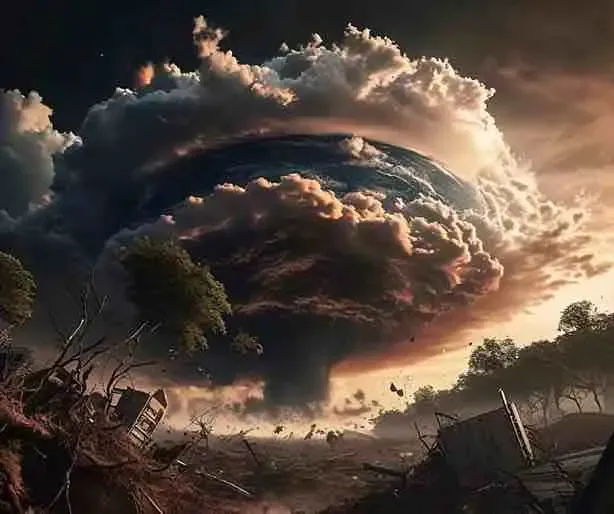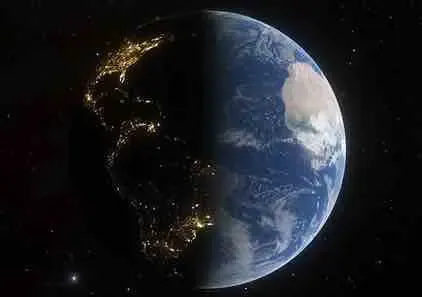The rotation of the Earth has great effects on our planet's environment, weather patterns, and even the way life has evolved. But what if the Earth suddenly started rotating in the opposite direction? This hypothetical scenario is not just a weird thought experiment but a way to understand the complex interplay of forces that govern our planet. Here, we will explore the events and consequences of the Earth reversing its rotation.
Understanding Earth's Rotation
Currently, the Earth rotates from west to east. This rotation takes about 24 hours and is responsible for the cycle of day and night. The Coriolis effect, caused by this rotation, influences wind patterns, ocean currents, and even the flight paths of long-distance airplanes. The equator rises slightly due to the centrifugal force generated by the rotation, making the Earth an oblate spheroid rather than a perfect sphere.
Immediate Effects of a Reversed Rotation
If the Earth were to suddenly start rotating backward, the immediate effects would be catastrophic. The inertia of the atmosphere, oceans, and everything not firmly anchored to the Earth's crust would cause massive destruction.
1. Atmospheric Disruption
The atmosphere would lag behind the sudden change, leading to extreme weather conditions. Winds of unprecedented speeds would sweep across the surface, causing widespread destruction.
2. Oceanic Chaos
3. Seismic Activity
Long-Term Climatic Changes
Once the immediate chaos subsided, the Earth would settle into its new rotational pattern. However, the long-term climatic changes would be profound.
1. Reversal of Wind Patterns
2. Shift in Ocean Currents
3. Changes in Day and Night Cycle
Impact on Ecosystems
The reversal of the Earth's rotation would have a cascading effect on ecosystems worldwide.
1. Disruption of Migration Patterns
Many animal species rely on predictable wind and ocean current patterns for migration. The reversal of these patterns would confuse and potentially endanger migratory species.
2. Alteration of Habitats
Changes in climate and weather patterns would alter habitats. Some regions might become more hospitable, while others could become uninhabitable. This would force species to adapt, migrate, or face extinction.
3. Impact on Agriculture
Agricultural practices are finely tuned to current climatic conditions. A reversal of these conditions would necessitate a complete overhaul of agricultural practices, potentially leading to food shortages and economic instability.
Human Adaptation
Human societies would face significant challenges in adapting to the new rotational direction of the Earth.
1. Infrastructure Damage
The initial atmospheric and oceanic disruptions would cause widespread damage to infrastructure. Rebuilding efforts would be costly and time-consuming.
2. Economic Impact
The reversal of climatic and weather patterns would disrupt agriculture, fishing, and other industries, leading to economic instability.
3. Health Effects
Changes in climate could lead to the spread of diseases to new regions. Additionally, the psychological impact of such a drastic change could lead to increased stress and mental health issues.
Historical and Cultural Implications
The reversal of the Earth's rotation would have profound implications for human culture and history.
1. Historical Records
Many historical records and navigational practices are based on the current rotational direction. These would need to be rewritten or adapted to reflect the new reality.
2. Cultural Adjustments
Cultural practices related to the sun's movement, such as certain religious rituals and agricultural practices, would need to be adjusted.
3. Technological Adaptation
Navigation, satellite communication, and other technologies that rely on predictable patterns of Earth's rotation would need to be re-engineered.
Hypothetical Scenarios
To better understand the impact, let’s explore some hypothetical scenarios:
1. Reversed Rotation Gradually
If the Earth’s rotation gradually reversed over millions of years, ecosystems and human societies would have time to adapt. Evolution would favor species that could thrive in the new conditions, and human technology and infrastructure would evolve accordingly.
2. Reversed Rotation Instantly
An instant reversal would be catastrophic. The immediate physical impacts would be devastating, and the long-term climatic changes would pose a significant challenge to survival.
3. Partial Reversal
If the Earth’s rotation slowed and then reversed, the transitional period would be marked by extreme weather and geological activity. The gradual nature of the change might allow for some adaptation, but the overall impact would still be severe.
Scientific Speculation
Scientists have speculated about the impact of a reversed rotation. Studies using climate models have shown that such a change would lead to a more symmetrical distribution of land and sea temperatures, potentially reducing the severity of some climate phenomena like hurricanes. However, the overall impact on life and human society would still be profoundly disruptive.
Conclusion
The hypothetical scenario of the Earth starting to rotate backward offers a fascinating glimpse into the complex dynamics that govern our planet. The immediate effects would be catastrophic, causing widespread destruction and upheaval. In the long term, the reversal of climatic patterns, ocean currents, and wind systems would challenge ecosystems and human societies to adapt in unprecedented ways.
While such a scenario is purely speculative and unlikely to occur, it underscores the delicate balance of forces that sustain life on Earth. Understanding these forces helps us appreciate the stability we often take for granted and highlights the need to protect the delicate environmental systems that support life on our planet.












